Righteous Among the Nations Kateryna Sheremeta: "Ukrainians who refused to join collective farms were deported by the Soviets"
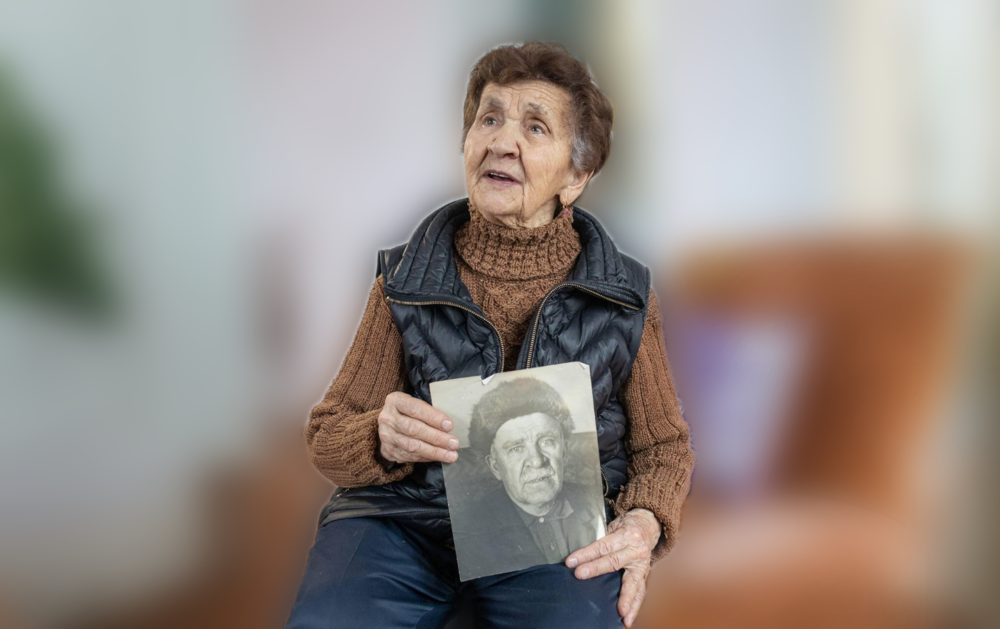
On 14 May, Ukraine celebrated the Day of Remembrance of Ukrainians who rescued Jews in World War II. The state honors the Righteous Among the Nations recognized by Israel and Yad Vashem, as well as other known and unknown rescuers of the Jews. Four of about 2,700 Ukrainian Righteous are still with us.
It is a great honor for Ukrainian-Jewish Encounter (UJE) to interview Kateryna Sheremeta, one of the last women among the Ukrainian Righteous. She was born into a large Ilnytsky family in the village of Rostochky in what is now Ivano-Frankivsk Oblast in 1934. Her father, Petro, had children from his first marriage and four sons — Vasyl, Stepan, Karol, and Mykhailo — with his wife Maria, who passed away when Kateryna was three years old.
Holocaust in Stanisławów
The city of Ivano-Frankivsk, called Stanisławów before World War II, was founded in the 17th century, and the Jewish community has been involved in developing the region since then. Jews were members of local self-government bodies and accounted for up to 10 percent of the region's population.
Nazi invaders occupied the city in the summer of 1941. According to Yad Vashem, the Germans issued an order demanding to receive lists of all Jews by profession by 1 August 1941, apparently to employ them under the German administration. The next day, the Germans began to summon "professional representations" according to the lists compiled by the Judenrat. These people were exterminated in a campaign organized by the Nazi officer Hans Krueger in what became known as the "intelligentsia action." Eight hundred educated Jews and Poles were summoned to the police and arrested. The next day, 600 of them, half-dressed, were moved in trucks to a remote grove 25 kilometers from the city and shot there.
On 12 October 1941, on the Jewish holiday of Hoshana Rabbah, more than 10,000 Jews were driven to the Jewish cemetery and killed there. A ghetto was set up in Stanisławów immediately after that. According to Yad Vashem, "the ghetto occupied about an eighth of the city's territory and was located in its easternmost part. There were not enough wells with drinking water, and many houses were dilapidated. The Jews had to move to the ghetto in the first half of December 1941. A few days after the resettlement, the ghetto was closed. About 30,000 Jews ended up there, including runaways who escaped after the destruction of small communities on the outskirts of the city. Only people with appropriate passes could leave the ghetto. Thus, the Jews of Stanisławów were locked in the ghetto and had to cope with new harsh conditions, trying to adapt."
How the Ilnytskys saved the Jews
Kateryna's father, Petro Ilnytsky, was a widower with five children when World War II broke out. He worked as a construction worker and managed a household.
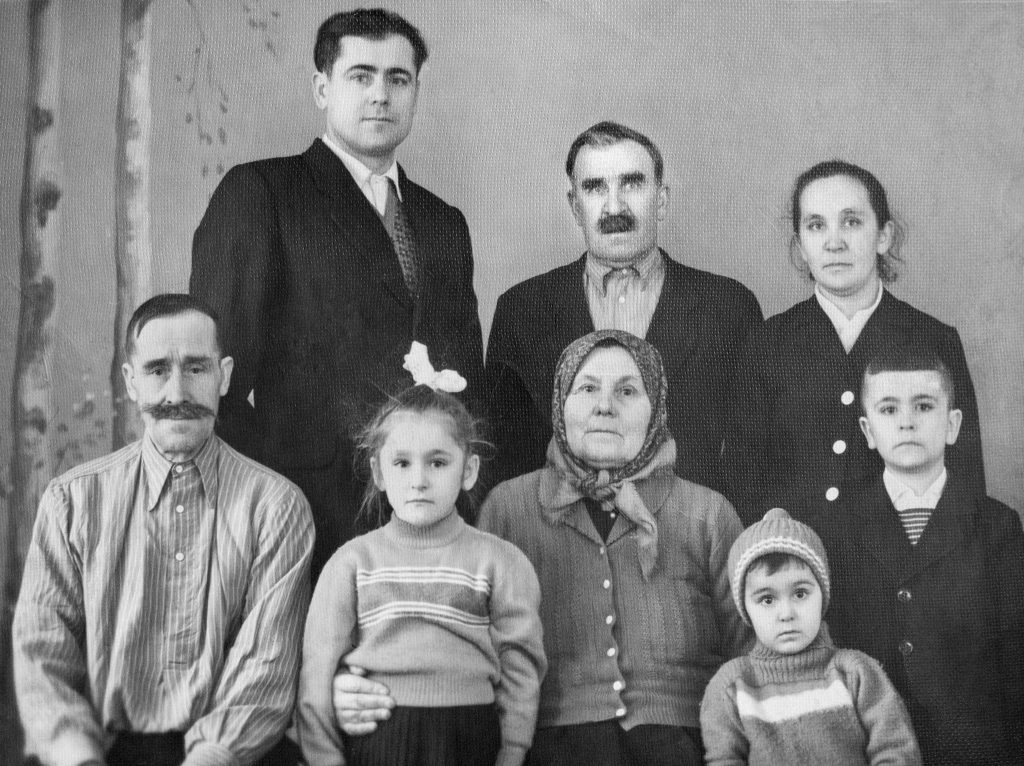
Even before the war, Petro was friends with the Kesslers, a Jewish family. They had escaped from the ghetto in Bolechów and were the first to turn to Petro for help. The Ilnytskys took them into hiding. "My father was a man of faith, and he believed he was doing a good thing for G-d and the people," says Sheremeta.
Subsequently, Petro supported several families, some hiding at his property and others in the nearby forests. Yad Vashem mentions the names of the rescued families: the Grünschlags, Rosens, Ginzburgs, and others. Jews lived in a dugout that accommodated 16 people at one point. Other hideouts nearby were discovered by the authorities, and the Jews there were killed. Life in the forest was tough, especially in winter, when people could not walk to their dugout through the snow, fearing their tracks would reveal their location.
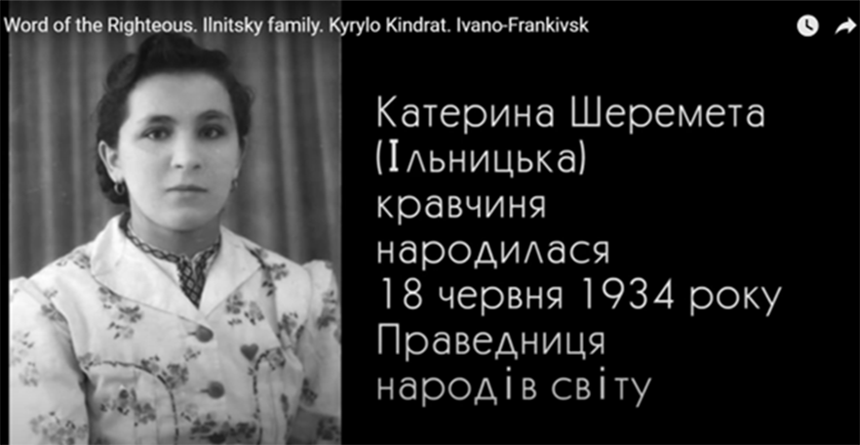
After World War II, some Jews went abroad, while others, for example, the Löw family, stayed back in the Ukrainian SSR. The later life of the Ilnytskys was not easy. The Soviets tried to set up collective farms and Russian schools in the region. When this policy failed, they decided to deport Ukrainians en masse. The entire Ilnytsky family was forcibly deported to Kazakhstan, where they lived in Karaganda for 20 years. They were able to return to Ukraine in the 1970s.
In 1994, Yad Vashem recognized the Ilnytsky family as Righteous Among the Nations. Kateryna Sheremeta, aged 90, now lives near Ivano-Frankivsk in the same house her father built in the 1970s. She worked as a tailor all her life and was an excellent master of the craft.
On 24 February 2022, like all the Righteous Among the Nations, Sheremeta received an invitation from the State of Israel to move to Poland or Israel. However, she refused, deciding to stay in her native land. She has kindly agreed to answer the questions from the Ukrainian Jewish Encounter.
What were your first thoughts when Russia launched a full-scale invasion of Ukraine on 24 February 2022?
I thought it was time to give Ukraine freedom. Enough torturing our people! Children are dying; people are dying. For what? This is an excruciating question. I really want us to be free and our children to live and enjoy the kindness and grace they deserve. I want them to know that the Lord, our G-d, protects them.
For your family, the history of Russian persecution is no surprise. In 1945, your family was deported to Karaganda, where you lived for 20 years. Why did the Soviet authorities deport Ukrainians from the Ivano-Frankivsk region?
After 1945, the Soviet authorities began to set up collective farms in our country. People had to write applications to join them. Such was the demand of the NKVD. But those who applied, agreeing to join a collective farm, were no longer allowed to travel anywhere. People in collective farms did not even have passports and were unable to travel to another district or region.
The NKVD also demanded that people study the Russian language and the Soviet system and send their children to Soviet schools. People were arrested for wearing Ukrainian clothes, [embroidered] shirts. All of this was punished.
Later, those who did not want to work in collective farms or send their children to Soviet schools began to be evicted. People started being evicted en masse in 1947. Those who were pro-Ukrainian were forcibly deported to distant lands, to Karaganda, Siberia, and Khabarovsk.
Deportation was carried out in inhuman conditions. My aunt Yulia Ilnytska had five children. They were all deported to Kazakhstan. Two children died on the way there and were thrown out from the train carriage. Three reached Kazakhstan as they promised to study to become literate and get a job.
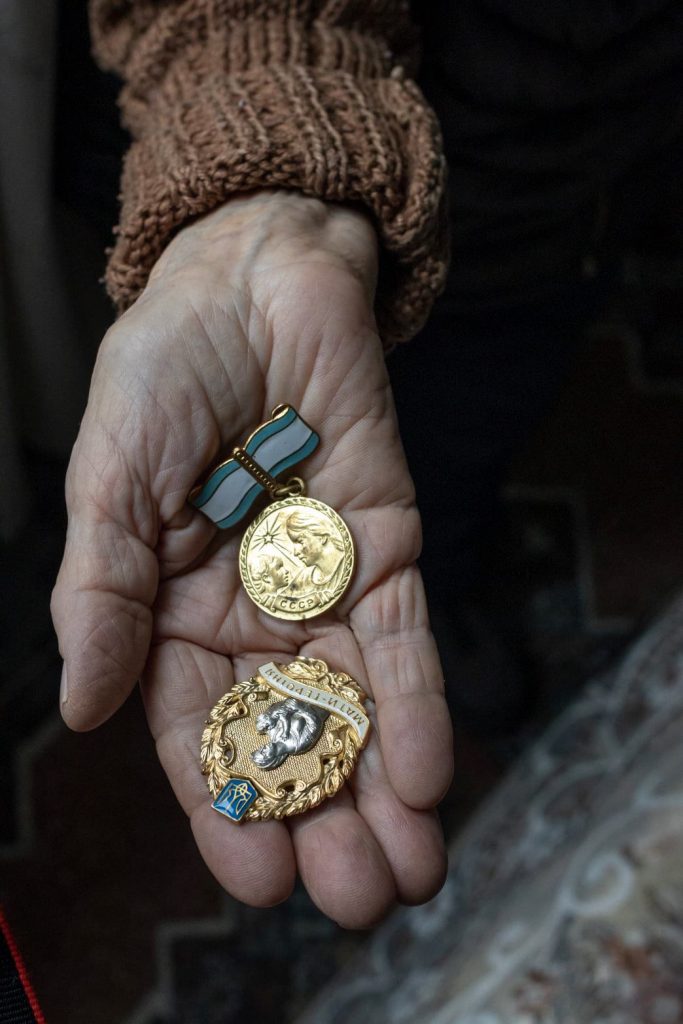
Were Ukrainians also taken to forced labor during the German occupation?
Yes, when we were under the Nazis, Ukrainians were deported to Germany to work. People could be plucked directly from the street or from the road. In Germany, some worked in households, and others helped care for children or sick relatives. The Soviet army returned these Ukrainians to Ukraine in 1945, and then everyone who had worked for the Germans, voluntarily or not, was imprisoned.
Do you remember life in deportation? People from which regions were there in Karaganda?
Many nations were represented there: Ingushes, Germans, Chechens, Georgians. Latvians, Estonians, Belarusians, Kazakhs, etc. People from the Baltic republics and other nations were deported because they wanted to have their own life and culture. They were deported for their "nationalist views," and they always used to say: "We are not from the Baltics. We are from Latvia; we are from Estonia."
Russian was the language of communication among us because as soon as we started speaking Ukrainian, we were branded nationalists.
Ukrainians and Germans were the biggest groups there. There were a lot of Germans from beyond the Urals. They were all taken to Karaganda and Tajikistan. Later, when the USSR fell apart, all Germans left for Germany.
Were any Jews there?
There were few Jews, but I think they did not openly identify as such. During Soviet times, Jews often did not reveal their ethnic background. I grasped this when they started building a Jewish community in Ivano-Frankivsk in the 1990s, and I saw my friends in the synagogue. They had never said before they were Jews.
How did you return from Karaganda?
It was 1974. There was an opportunity to return to the Ivano-Frankivsk region after 20 years of deportation. We bought a house near Ivano-Frankivsk and moved there. Our distant relatives lived in our old house in Rostochky, but we did not claim that house. A village council was later set up in that building.
What is similar between the Russian-Ukrainian War and World War II?
Nothing. Back then, it was still possible to do something to save others because there were some rules. Now, everyone is being killed; children are being killed. There are no limits. During World War II, the military was fighting, and the civilian population did not suffer as much as now. Except for the Jews who were killed by the Germans. Still, people made dugouts and hid Jews there.
Have you kept in touch with the rescued Jewish families?
[Initially,] we didn't know how to find them. One family later found us and asked us to take them to the cemetery, wishing to thank my father. This family came from Australia in the early 1990s and asked us to show where my father, Petro Ilnytsky, was buried. We met them and took them to the cemetery. There, at his grave, the daughter of the man he rescued said: "Petro, I am grateful to you for saving my father's life."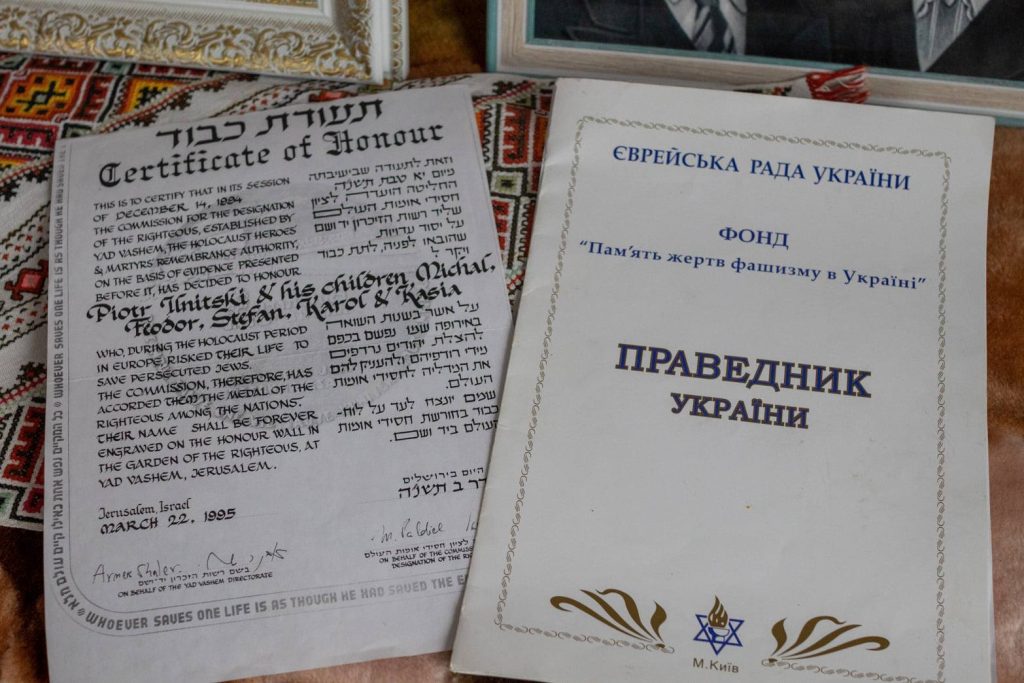
What is needed for Ukraine to receive more support from the world now?
I am not a politician and cannot speak for those who rule the states. Only they see and know what is needed and what is not needed.
What must happen for the Russian–Ukrainian War to end?
People need to come to the Lord, our G-d. War is waged by people who do not want to know G-d. As they say in our country, "Without G-d, you will not even reach the threshold." People should know what G-d's will is and that there are G-d's commandments, including ‘Thou Shalt Not Kill.’
Do you think that in the event of Russia's victory in Ukraine, things will be worse than in Soviet times?
It was terrifying to live in the USSR under Stalin, and then Khrushchev was able to make life easier for people. But still, we could not leave the Soviet Union.
What do you ask G-d for in your prayers?
I beg Him to grant peace on earth. No one has seen G-d, but it'll be given to you according to your faith. I also pray for my health and for my children because these are the most important things.
May G-d hear your prayers and grant your requests. My deep respect to your family!
The Word of the Righteous film about the Ilnytsky family:
Marharyta Ormotsadze
Marharyta Ormotsadze is a co-founder/producer of the Word of the Righteous project, which tells about the valor of Ukrainians who saved Jews throughout Ukraine during the Holocaust.
Translated from the Ukrainian by Vasyl Starko.



















